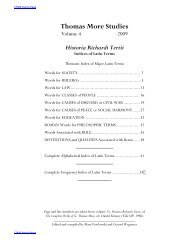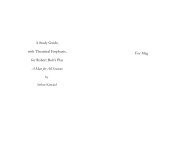life of john picus earl of mirandola - The Center for Thomas More ...
life of john picus earl of mirandola - The Center for Thomas More ...
life of john picus earl of mirandola - The Center for Thomas More ...
Create successful ePaper yourself
Turn your PDF publications into a flip-book with our unique Google optimized e-Paper software.
A constant faith<br />
[72]<br />
What cause should<br />
make us willing and<br />
glad to die<br />
22 <strong>Thomas</strong> <strong>More</strong>’s Life <strong>of</strong> John Picus<br />
Godhead was be<strong>for</strong>e all time begotten <strong>of</strong> His Father, to Whom He is<br />
also equal in all things, and Which <strong>of</strong> the Holy Ghost, God also, <strong>of</strong><br />
Him and <strong>of</strong> the Father coeternally 1 going <strong>for</strong>th (which three Persons<br />
be one God) was in the chaste womb <strong>of</strong> our Lady, a perpetual virgin,<br />
conceived in time; Which suffered hunger, thirst, heat, ⌐ cold, ¬ labour,<br />
travail, and watch; 2 and Which at the last <strong>for</strong> washing <strong>of</strong> our spotty sin<br />
contracted and drawn unto us in the sin <strong>of</strong> Adam,¦ <strong>for</strong> the sovereign<br />
love that He had to mankind, in the altar <strong>of</strong> the cross willingly and<br />
gladly shed out His most precious blood:–when the priest inquired<br />
<strong>of</strong> him these things and such other as they be wont to inquire <strong>of</strong> folk<br />
in such case, Picus answered him that he not only believed it but also<br />
certainly knew it.¦ When that one Albertus,¦ his sister’s son, 3 a young<br />
man both <strong>of</strong> wit, cunning, and conditions excellent, began to com<strong>for</strong>t<br />
him against death and by natural reason¦ to show him why it was not to<br />
be feared but strongly to be taken as that only thing which maketh an<br />
end <strong>of</strong> all the labour, pain, trouble, and sorrow <strong>of</strong> this short, miserable,<br />
⌐ deadly ¬ <strong>life</strong>, he answered that this was not the chief thing that should<br />
make him content to die, because the death determineth the manifold<br />
incommodities and painful wretchedness <strong>of</strong> this <strong>life</strong>; but rather this<br />
cause should make him not content only but also glad to die, <strong>for</strong> that<br />
death maketh an end <strong>of</strong> sin, inasmuch as he trusted the shortness <strong>of</strong><br />
his <strong>life</strong> should leave him no space to sin and <strong>of</strong>fend. He asked also all<br />
his servants’ <strong>for</strong>giveness if he had ever be<strong>for</strong>e that day <strong>of</strong>fended any <strong>of</strong><br />
them;–<strong>for</strong> whom he had provided by his testament eight years 4 be<strong>for</strong>e:<br />
<strong>for</strong> some <strong>of</strong> them meat and drink,¦ <strong>for</strong> some money, each <strong>of</strong> them<br />
after their deserving. 5 ¦ He showed also to the above-named Albertus<br />
¦ 7 <strong>More</strong> omits proque reseranda ianua coeli, “and to open the gates <strong>of</strong> heaven” (CW 1:330, 331).<br />
/ 12 <strong>More</strong> omits Et item illud, “And likewise the following” (CW 1:332, 333). / <strong>More</strong> omits<br />
quem nominavimus inter huius vitae initia, “whom we mentioned at the beginning <strong>of</strong> this Life” (CW<br />
1:332, 333). / 14 <strong>More</strong> omits Gianfrancesco’s claim that Alberto employs the same argument<br />
here as that set <strong>for</strong>th by Alexander <strong>of</strong> Aphrodisias and <strong>The</strong>mistius as well as Averroes; he also<br />
omits Gianfrancesco’s inquam, “I say” (CW 1:332, 333). / 25 <strong>More</strong> omits & tegumentum, “and<br />
clothing” (CW 1:332, 333). / 26 <strong>More</strong> omits Et illud praeterea, “And moreover the following<br />
incident” (CW 1:332, 333).<br />
1. coeternally: This usage in the sense <strong>of</strong> “with equal eternity” antedates the <strong>earl</strong>iest recorded in<br />
OED (s.v. coeternally adv.).<br />
2. hunger…watch: <strong>More</strong> changes the Latin word order and translates labores twice (CW 1:225).<br />
3. his sister’s son: Alberto was the son <strong>of</strong> Caterina, Picus’ eldest sister.<br />
4. eight years: “A mistranslation <strong>of</strong> the Latin ‘ante acto anno’…, presumably either because <strong>More</strong><br />
misread ‘acto’ as ‘octo’ or because there was such an error in <strong>More</strong>’s Latin text. Picus’ will was<br />
actually dated September 1, 1493” (CW 1:225).<br />
5. He asked…their deserving: This passage does not come until later in the Latin original (in the same<br />
paragraph, following “…the heavens open”). In this passage, <strong>More</strong> omits certiores facti sumus, “we<br />
were truly in<strong>for</strong>med that” (CW 1:332, 333).<br />
5<br />
10<br />
15<br />
20<br />
25











